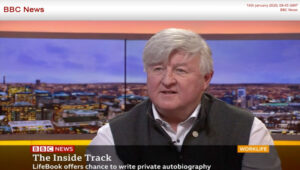
LifeBook Memoirs Founder Roy Moed Featured on BBC
BBC recently gave Roy an opportunity to talk about why he founded LifeBook Memoirs
Roy Moed, the founder of LifeBook Memoirs and its parent company LifeBook, recently appeared on BBC News to discuss the growing trend of writing your own autobiography. Check out the video below!
Transcript
Sally Bundock: So you won’t be surprised to hear that autobiographies are one of the best-selling book categories out there. And our next guest wants to offer everyone the help they need to write their own. Even if it’s only for friends and family.
Karin Giannone: Lifebook is a private autobiography service. It aims to give elder adults both a legacy and a project to enjoy and live for. The company’s founder was inspired to start the business while caring for his father throughout an illness.
Bundock: Well let’s introduce to you Roy Moed, who’s founder and chief executive of LifeBook. Welcome.
Roy Moed: Morning.
Bundock: And you’ve got the book you produced for your dad right there. Indeed and also another one to show us. So just tell us a bit more about how this started because you were actually in the airline industry, weren’t you?
Moed: Yes, I was learning to deal with mergers.
Bundock: Nothing to do with books.
Moed: No, not at all and academically, I wasn’t in that sort of space. I’m dyslexic anyway. So to be a publisher now and producing over 8,000 titles is quite a different challenge. I started with my father, did the first book and then decided that I actually wanted to do this for people around the world and make it achievable. So I used my airline logistics background to systemize it and I deconstructed the interviewer from the writer. So the interviewer is actually somebody with empathy, active listening, who is local to where your parent or grandparent is. And they go along and they interview them, record it 12 times over a period of some 90 minutes each and then they upload that.
Bundock: And just talk us through the process because you’ve actually created books for people all over the world. So you’ve had to have people that can interview people in different cities, different towns globally and then obviously, they end up with this book. How does it work?
Moed: So, we have about 300 interviewers and writers around the world and 20 people back at LifeBook’s head office in Godalming and the platform that we developed manages everything. So project manager, from the beginning, is in touch with say your grandparent and they carry that right through the six-month process. And at the end of that, the interview is being written. Then, it gets edited, typeset, proofread, and then printed on beautiful archive paper.
Giannone: Roy, tell us about what actually inspired you specifically about the conversations that you had with your father that then led to this.
Moed: Well I really wanted him to have a project, I wanted him to have something to do. And he actually made a statement that he felt that he didn’t have anything to contribute anymore once.
Giannone: He told you that?
Moed: Well yes. Well, we’ve got it, we’ve got that on the small video my niece Gemma did. And that was really the inspiration for LifeBook it was to actually find that moment.
Bundock: I have to say, I thought about this for people that I know who may no longer be with us soon. And they’ve lived through the Second World War and, in the case of all my great-grandma, two world wars, she is literally a hundred. So, it’s capturing stories which are fascinating and may not be heard otherwise but it does sound expensive, Roy.
Moed: It’s stories in that social history. What price do you put on that? It is priceless. By systemizing it the way we do it.
Bundock: But it starts at seven and a half thousand pounds could go up to something like 30,000. Just to give you a sense of where we are.
Moed: Yeah, it’s 150 hours work and that’s the price of a gardener really if you put it in that context. A lot of our customers are buying it for themselves. The average age of our customers is 82.
Bundock: They’re buying it for themselves?
Moed: Yes, we think people should be gifting it to their parents but they’re not. These people want to have a legacy. One of our customers said, “Look if I just leave another seven and a half grand to my kids, what are they going to do with it? They’re going to blow it. I’m going to leave them 10 precious books about their history.”
Giannone: And, I mean, the process itself of the interviews, the sessions, you said it’s a series of 12 90-minute meetings. How much did that benefit the person who’s telling the stories?
Moed: Totally. We researched this in the Brain Health Institute in Toronto and we found that regular interviews over a period of time enabled you to process. It’s a little bit like therapy but with this, it is therapeutic not therapy.
Bundock: I know with your dad it wasn’t a book initially was it? It was sort of a printed out document a manuscript. Did he actually ever see the book?
Moed: In honestly, I didn’t look at it for a couple of years until I had the idea and said, “Well maybe I can do this for more people if I could find a way to systemize that.” And that’s why LifeBook was created.
Giannone: All right. Thank you very much for coming in and sharing your story, Roy Moed of LifeBook.
If you are interested in creating a gift of a LifeBook, then contact our team today.
